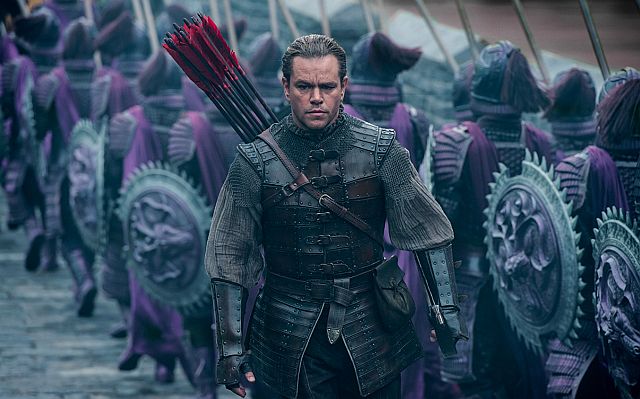
A HORDE of monstrous demons are ready to rampage through medieval Peking and it’s Matt Damon (“Jason Bourne”) to the rescue in “The Great Wall.”
And great this wall is—the only man-made structure clearly visible to the eyes of astronauts in the International Space Station.
Spanning 5,500 miles, the Great Wall of China took more than 1,700 years to build. Ostensibly, it was constructed to defend the valley below, where today rests modern-day Beijing, from the marauding Mongol hordes descending from the north.
The Great Wall has stood the test of time. Nothing can tear it asunder.
Except for a movie bearing the same name.
With the lamest of CGI special effects coming from a major Hollywood studio, “The Great Wall” follows “a mercenary warrior (Matt Damon) who is imprisoned within the Great Wall, where he discovers the mystery behind one of the greatest wonders of the world. As wave after wave of marauding beasts besiege the massive structure, his quest for fortune turns into a journey toward heroism as he joins a huge army of elite warriors to confront the unimaginable and seemingly unstoppable force.”
Actually, Damon was probably more enticed by the film’s $150 million dollar budget.
“The Great Wall” is directed by Zhang Yimou who is world famed for guiding the Opening Ceremonies of the Games of the 29th Olympiad in Beijing in 2008. Commenting about the Olympic Opening, Zhang said that he employed thousands of People’s Liberation Army soldiers to outfit the ranks of his entertainers, simply because they are trained to obey orders.
Clearly he did the same here as the acting is stunted and authoritative.
Damon and his fellow “Western” actors … Willem Dafoe (“Streets of Fire”) and Pedro Pascal (“HBO’s Game of Thrones”), try to breathe life into this dull script written by five authors, primarily Max Brooks (“World War Z”) but it’s a miserable effort.
Watching “The Great Wall” is akin to suffering through a Chinese TV soap opera of jumping and leaping medieval guards in full, shiny blue or grey, plastic looking battle uniforms. It is clearly impossible to move in these costumes–that is if they were real–as it would be more than 100 lbs. on your back.
Damon and Pascal are running (and on horseback galloping) for their collective lives in the film’s opening from local mercenaries … themselves Europeans sneaking their way into China to steal “black powder” (gunpowder) and bring it back to Europe and sell it for a king’s ransom.
XUAN Huang in a scene from “The Great Wall”
Instead they both are pitifully captured and brought within the Great Wall just before an army of slithering giant green “dragons” descend on their position, that being on top of the fortified structure.
This is the one and only time “The Great Wall” really lets loose and has some fun. Much like in 2013’s “World War Z” when thousands of undead climbed on top of one another to rise above any man-made structure, these demons must have rented a DVD of this same film and mimicked the zombies … tit for tat. Climbing over each other and on top of the wall, the stunt action with the bowman Damon cutting down the marauding hordes was exceptionally great.
Then, this movie will put you into a deep, fitful sleep.
Having pushed back the attacking demons, both Damon and Pascal are seduced by Dafoe—himself a “Westerner” seeking gunpowder and instead was been captured decades ago and forced to live out the rest of his days on top of the Wall—to grab everything they can and run for the hills and leave the Chinese defenders to a fate of their own making.
The third act of ancient Peking being overrun by the demon hordes present the worse special effects of any action adventure or comic-book movie you can think of.
Pretty much down in the sewers of filmdom with “Superman Returns.”
Really dreadful.
The lead actress—Chinese superstar Tian Jing—is as stiff as her armor and both she and Damon merely look at each other for minutes on end as if the screenwriter Brooks ran out of ink for his typewriter and left these two with nothing to say.
“The Great Wall” is the first project by the new Legendary Pictures, now controlled by Beijing-based Wanda Group and it has done fairly well at the international box office—raking in $200 million so far—half coming from the Chinese market alone.
The future of major motion pictures, both production and distribution may soon lay far north of the Philippines—in the People’s Republic of China.
One can only hope the next such offering is lighter on the starch.
Questions, comments or travel suggestions, write me at readingruffolos@gmail.com.